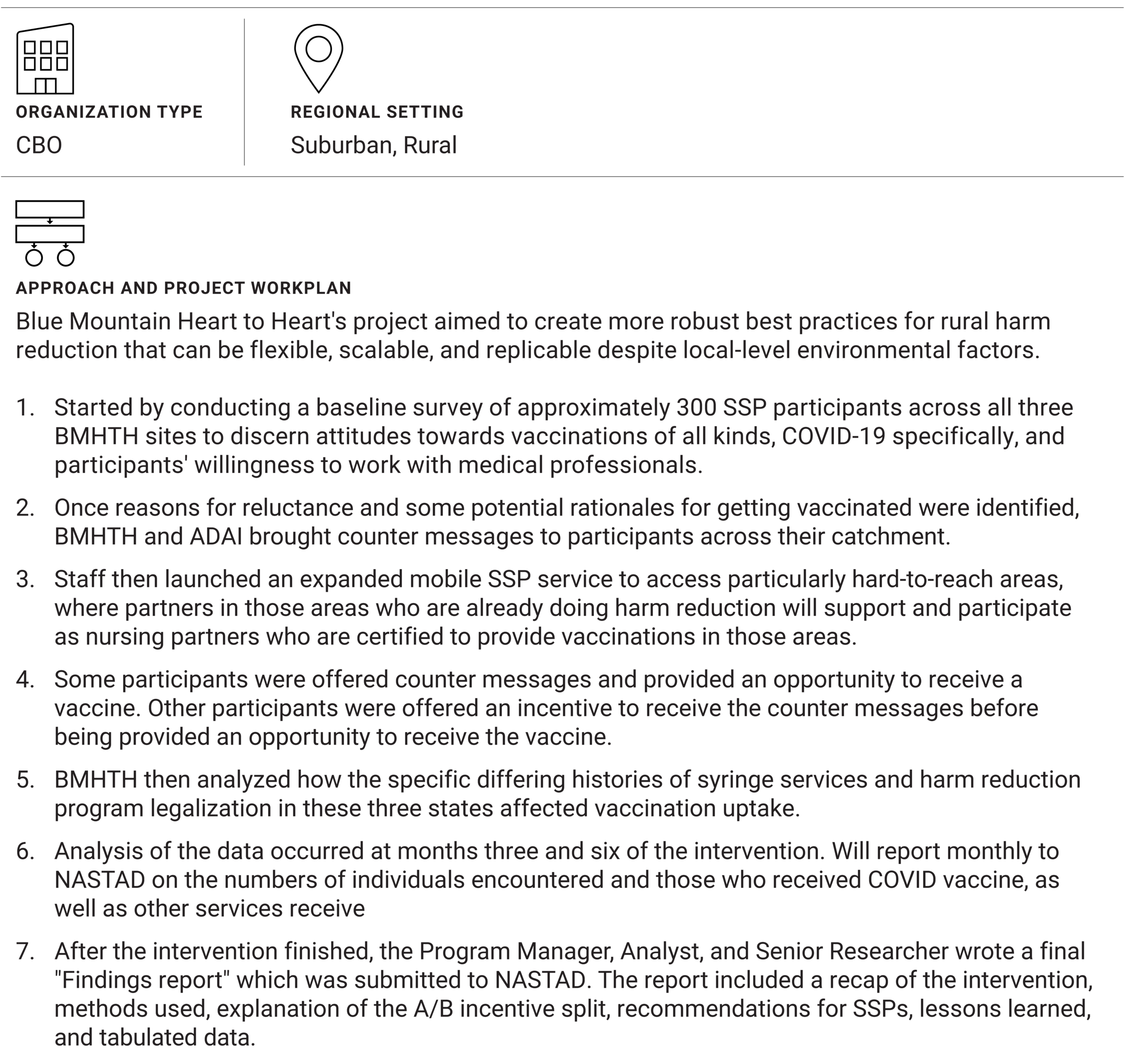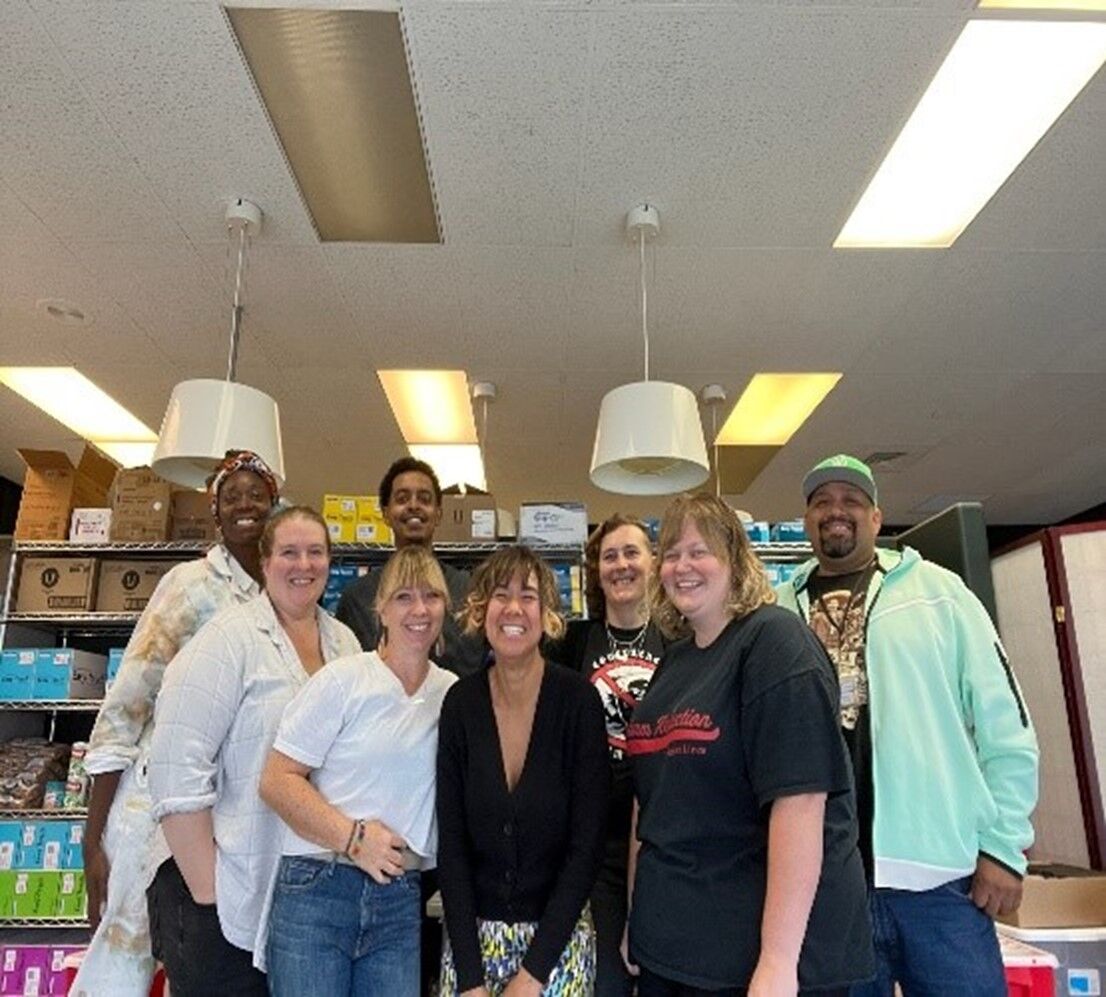
Blue Mountain Heart to Heart (BMH2H)
Overview
Blue Mountain Heart to Heart is a community-based organization in Walla Walla, Washington focused on serving marginalized communities in rural areas in order to improve individual and community health. Across six counties and five offices, we support two major program areas: case management for specific client populations, and prevention programs to limit the spread of communicable disease.
Creative Approaches
Drug Checking
Blue Mountain Heart to Heart has found a creative solution to a common challenge by incorporating a drug-checking aspect into their services. Participants are able to bring in samples of their drugs and have them tested for potential overdose-causing agents, helping to build trust and keep them safe from overdoses. This additional service not only informs every interaction with their participants but also demonstrates a commitment to harm reduction and the well-being of those they serve. By offering drug checking, Blue Mountain Heart to Heart can provide a comprehensive approach to supporting individuals in their community who use drugs, ultimately contributing to a safer and healthier community for all.
Vaccinations at local Jails
Their program has innovatively expanded its efforts to provide COVID-19 vaccinations at local jails, offering inmates the opportunity to receive the vaccine in order to protect their health and prevent the spread of the virus within the facility. To incentivize participation, the program has incorporated cupcakes as a reward for those who choose to get vaccinated. This unique approach has proven to be successful, with a high vaccine uptake among inmates. By offering a sweet incentive, the program is helping to ensure that as many individuals as possible receive the vaccine, ultimately benefiting the entire jail population and community at large.
Expanding to meet a growing need
In addition to opening a location in Walla Walla, Blue Mountain Heart to Heart also expanded its services to the Tri-City area (Kennewick, Pasco, Richland), located about an hour away. This decision was made based on the higher population in the Tri-City area (roughly 3 times the population of Walla Walla, Washington), as well as the urgent need for harm reduction services. The program recognized that the demographics and drug trends of the Tri-City area differed from that of Walla Walla, requiring a different approach to effectively serve the community. In line with their commitment to cultural humility, Blue Mountain Heart to Heart hired members from the most heavily impacted demographics from the Tri-City community to ensure that their services were tailored to meet the specific needs of the area.
Successes
Vaccine Hesitancy investigation and counter messaging:
Blue Mountain Heart to Heart collaborated closely with the University of Washington to undertake an important initiative involving the design, execution, and analysis of a study on vaccine hesitancy among participants. The primary objective of this study was to gain a comprehensive understanding of the factors that drive vaccine acceptance. By exploring various incentive strategies and counter messages, the study uncovered valuable insights. Over the course of the study, the percentage of individuals willing to receive the COVID-19 vaccine exhibited a consistent upward trend, indicating the effectiveness of the interventions and messaging implemented. The findings from this groundbreaking investigation have contributed significantly to the larger conversation surrounding vaccine uptake and public health.
Mobilizing services:
By creatively leveraging additional funding mechanisms, they were able to acquire the chassis of a mobile medical unit and successfully outfit it for mobile adult vaccination services. This move has allowed them to significantly expand their reach, ensuring that more individuals have access to crucial immunizations. Blue Mountain Heart to Heart's dedication to adaptability and their commitment to holistic healthcare reflects their unwavering focus on improving the well-being of their community. As such, BMHTH have been able to reach cities, counties and states that they have traditionally not been able to connect with.
Secured future funding to continue work as a “Center of Excellence”
Blue Mountain Heart to Heart (BMHTH), in partnership with the Washington State Health Care Authority (HCA) has been awarded $1.66M as the inaugural Health Engagement Hub rural pilot site contract. The health hub program sites will serve as all-in-one centers where people who use substances can access a range of medical, treatment, harm reduction, and social services. The project expands clinical, mental health, and harm reduction services to people who use substances in rural and geographically isolated areas by hiring a full-time physician to support primary care service, a substance use disorder professional, a program manager, and additional nursing coverage. BMHTH is known for identifying service gaps and launching programs to address those gaps. In their application, BMHTH noted that they recently finished this project for the CDC and saw 60 percent of participants who were hesitant to receive a COVID-19 vaccine agree to be vaccinated.
Challenges
Changes in vaccine type and provision
Blue Mountain Heart to Heart had meticulously planned to deliver the Johnson & Johnson vaccine to their participants due to its one dose nature and little required follow up. However, unforeseen circumstances arose when some participants expressed concerns about the vaccine's reported association with blood clots. Despite the SSP's efforts to address these concerns and educate the public, they were forced to move to the two dose Pfizer or Moderna options. This shift required additional planning to mitigate the challenge that could be follow-up appointments for second doses.
Changing trends in Drug supply
Blue Mountain Heart to Heart faced a major challenge due to the COVID-19 pandemic in Washington state, as the drug supply underwent significant transformations. Previously, heroin was widely used but, with the pandemic, fentanyl has now become the primary drug of choice. This shift in drug preference has necessitated a reevaluation of how to address opioid dependence. Moreover, the manner of drug consumption has also changed, demanding a different approach to tackle the new patterns of drug use. Consequently, there is a heightened worry surrounding the drug supply, specifically regarding the imminent risk posed by xylazine, further adding complexity to the situation.
Difficult climate
The climate in the eastern Washington region is variable, with temperatures in the summer sometimes exceeding 100 degrees Fahrenheit, and snow in the winter. Small towns do not have the resources to plow the side streets, and staff must make difficult decisions about whether to drive the mobile clinic on snowy, hilly streets in the winter. BMH2H makes every effort to not cancel shifts as much as possible and encourages their participants to take extra supplies when there is impending bad weather in the event that weather is prohibitive for mobile service operation.
Rural Harm reduction and the effects of overcriminalization and stigma
Implementing syringe services programs in rural areas comes with its own set of challenges, including the effects of “over-criminalization” of drug use. One of the main difficulties faced is the limited reach to the drug use community due to the close-knit nature of smaller communities and their wariness of outsiders. In these rural areas, people who use drugs often face heightened stigma and criminalization compared to their urban counterparts. Building trust and overcoming the deep-rooted stigma associated with drug use in rural communities becomes a complex and essential process for implementing syringe services programs effectively. Additionally, conducting outreach to rural communities of people who use drugs can be particularly challenging as many people in rural areas tend to use drugs within the confines of their own homes, making it harder to reach them in a noninvasive manner. This combination of limited trust, stigma, and rural criminalization creates a significant barrier in establishing and providing effective syringe services programs that offer vital harm reduction services and support to those in need.
We have shown through our low-barrier clinic program, and as a center of excellence with the CDC that BMHTH is a trusted and capable community organization that makes a real difference for stigmatized patient groups,” said BMH2H Executive Director Everett Maroon. “I’m very proud that Walla Walla will once again get a critical investment to help respond to the opioid crisis in an effective and compassionate way. We know that people can reclaim their lives and their health, and this award will help us extend our reach.
Total Monthly Data
|
Service |
Number of Encounters |
|
Received education on COVID and COVID vaccination |
2548 |
|
Referred to COVID vaccination |
2142 |
|
COVID-19 Vaccination (on-site) |
246 |
|
COVID-19 Vaccination (off-site) |
0 |
| Monkeypox vaccinations | 30 |
| Other vaccinations | 100 |
| Total encounters | 5807 |

